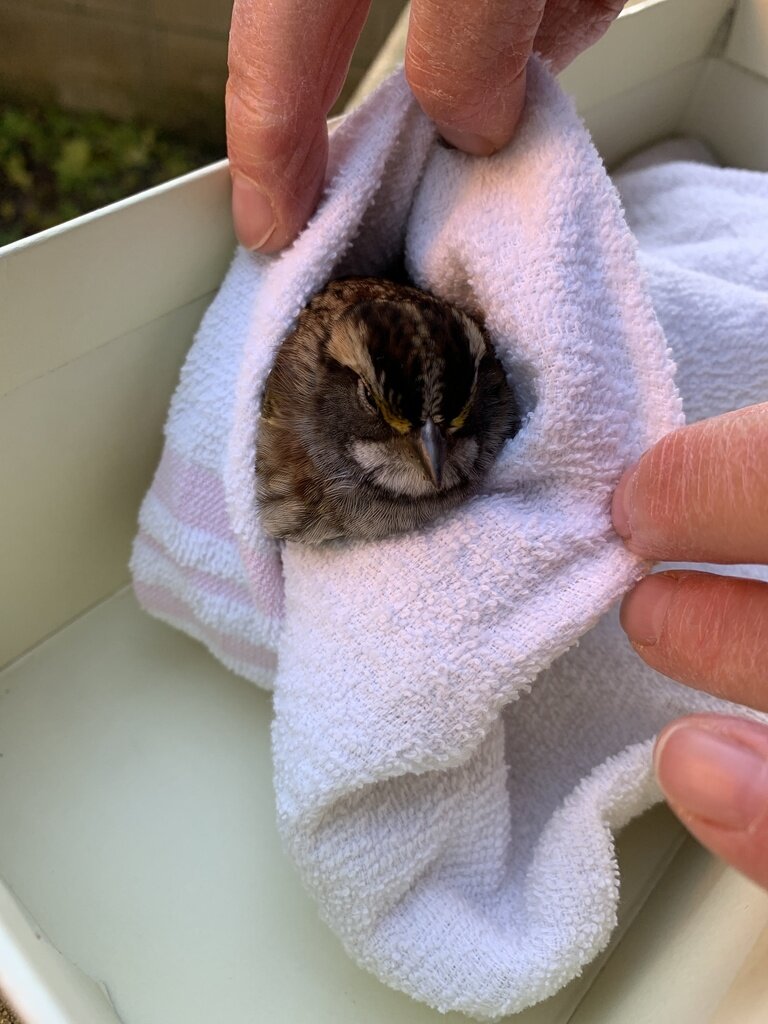What to do if you’ve found a sick, injured, or orphaned bird
As much as we would love to be able to help every bird, Southern Wisconsin Bird Alliance is not licensed to provide care for sick, injured, or orphaned wild birds. We love that our members are very caring and eager to help wildlife in need, and want to share a few tips on how to best approach a situation like this. For information and resources about avian influenza (HPAI) in Wisconsin, read our latest post.
A Bird Collision Corps volunteer helps an injured bird (photo by Beth Workmaster/BCC volunteer).
Is the wild bird showing any of the following signs or conditions?
Evidence of bruising, bleeding, or injury
Apparent broken limb
Emaciated, very weak, shivering, cold, or wet
Circling, rolling, staggering
Eyes are crusty, red, swollen
Attacked or brought in by a dog, cat, or other predator
Collided with a window
For young birds:
Extended periods of vocalization and wandering or repeatedly approaching people or pets
Parent is known to be no longer present or deceased
Birds with any of the above signs or conditions very likely need the assistance of a local wildlife rehabilitator.
Contact your local wildlife rehabilitator:
Madison, Dane County, or south-central Wisconsin: Dane County Humane Society Wildlife Center
Admitting procedure: Call first, leave a message at (608) 287-3235
Trained volunteers or staff will call you back between 9 a.m. and 5 p.m.
Other areas in Wisconsin: Wisconsin DNR Wildlife Rehabilitation Directory
Outside Wisconsin: find a wildlife rehabilitator near you
If you find a bird that has collided with a window, there are some steps you can take immediately.
A bird that survives a window collision may be stunned and need a little time to regain its senses before flying away.
Carefully put the bird into a cardboard box with a towel draped over the top. Ensure the bird has access to air, and place it in a cool, safe place away from people and pets. Do not try to force food or water upon the bird.
*Note: birds are very sensitive to their surroundings, and can even die from shock. For this reason, it is very important to be extremely gentle with the bird and the container when you move it.Every 15 minutes, remove the towel to see if the bird is able to fly away. If after an hour or two it hasn’t flown away, contact a local wildlife rehabilitator.
Luckily, window collisions are very preventable—check out these resources to prevent future collisions.
If you have found a baby bird, the first step is to determine if the bird is truly orphaned and needs help.
Fledglings are young birds that have just left the nest. They have feathers but short wings and tails. Often, they may be fed by their parents outside of the nest.
If the bird is not yet a fledgling (has no feathers or few feathers, may have only fuzz/fluff) but has fallen out of the nest prematurely, the bird’s best chance is to be reunited with its parents it not visibly sick or injured. Learn how to reunite a baby bird.
If you are ever unsure about how to handle a situation with a wild bird or don’t feel comfortable, contact a wildlife rehabilitator.
A note about reporting sick or dead wildlife
If you have found a sick/dead bird, you can also report it to the Wisconsin DNR, which relies on public reports to monitor some disease outbreaks in wild animals. Of particular interest are instances of five or more sick or dead birds in one area; any banded loons, eagles, Osprey; Trumpeter Swans with leg bands or neck collars; Peregrine Falcons; Greater Prairie-chickens and Sharp-tailed Grouse.
The Wisconsin DNR requests the following information in your message: the number of animals, the species (if known), if they were sick or dead, the specific location where you saw them (including the county), and your contact information (in case they need to follow up for more details). You can make a report in one of the following ways:
Email the Wildlife Switchboard at DNRWildlifeSwitchboard@wisconsin.gov
Leave a voicemail message for the Wildlife Switchboard staff at (608) 267-0866




